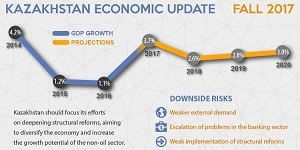
Kazakhstan’s Economy Rises
As Kazakhstan’s economy started to recover from the crisis caused by the fall of global oil prices, real GDP grew by 4.3% year-on-year in the first nine months of 2017, compared to 0.4% in the same period of 2016.
The oil sector was the main driver of economic growth, as oil output increased by 12.5% Y-o-Y in the first nine months of 2017 due to the launch of production at the long-awaited off-shore oil field Kashagan in October 2016.
More favorable terms of trade—as oil prices increased by 24% Y-o-Y in the first nine months of 2017—also contributed to better performance of the oil sector. Additionally, the construction sector rebounded due to new large capacity expansion projects in the oil sector.
The non-oil economy also expanded, on the back of more dynamic activity of the manufacturing, agriculture, transport, and trade sectors.
On the external balance side, while higher external demand and more favorable terms of trade led to an improvement in the trade balance, net foreign direct investment inflows decreased substantially, putting pressure on the tenge.
The growth estimate for 2017 has been revised upwards from 2.4% to 3.7%, reflecting the strengthened external environment, the resulting better-than-expected oil sector performance, and improved domestic demand—which has supported growth in the non oil economy.
Going forward, if the implementation of structural reforms is successful, it will assist in the diversification of the economy and would raise Kazakhstan’s growth potential. The ongoing structural and institutional reforms under the 100 Concrete Steps program and the privatization agenda aim to reduce the role of the state in the economy and facilitate the development of a vibrant, modern and innovative tradeable non-oil sector.
Furthermore, efforts to restructure and privatize state-owned enterprises (SOEs) would be expected to seek raising efficiency in public administration and reducing fiscal risks.
Prudent fiscal and monetary policies would support economic and price stability and encourage investments in the non-oil economy. Higher incomes will also have positive spillovers on poverty reduction.
Read full article at: World Bank